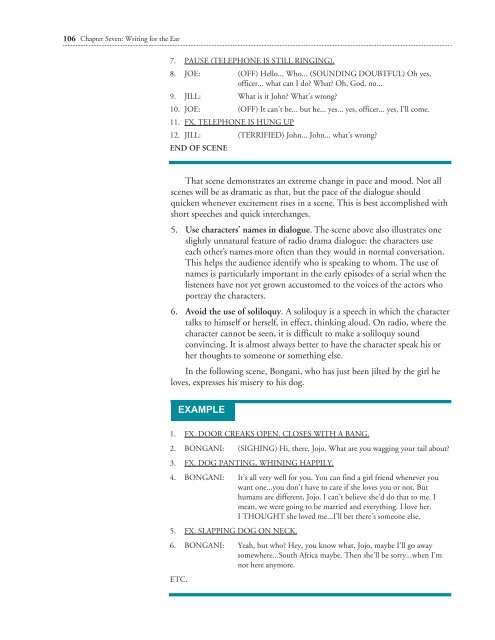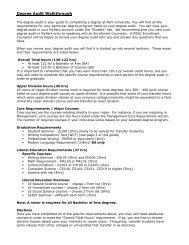How to Write a Radio Serial Drama for Social Development- PDF
How to Write a Radio Serial Drama for Social Development- PDF
How to Write a Radio Serial Drama for Social Development- PDF
Create successful ePaper yourself
Turn your PDF publications into a flip-book with our unique Google optimized e-Paper software.
106 Chapter Seven: Writing <strong>for</strong> the Ear<br />
7. PAUSE (TELEPHONE IS STILL RINGING).<br />
8. JOE: (OFF) Hello... Who... (SOUNDING DOUBTFUL) Oh yes,<br />
officer... what can I do What Oh, God, no...<br />
9. JILL: What is it John What’s wrong<br />
10. JOE: (OFF) It can’t be... but he... yes... yes, officer... yes, I’ll come.<br />
11. FX. TELEPHONE IS HUNG UP<br />
12. JILL: (TERRIFIED) John... John... what’s wrong<br />
END OF SCENE<br />
That scene demonstrates an extreme change in pace and mood. Not all<br />
scenes will be as dramatic as that, but the pace of the dialogue should<br />
quicken whenever excitement rises in a scene. This is best accomplished with<br />
short speeches and quick interchanges.<br />
5. Use characters’ names in dialogue. The scene above also illustrates one<br />
slightly unnatural feature of radio drama dialogue: the characters use<br />
each other’s names more often than they would in normal conversation.<br />
This helps the audience identify who is speaking <strong>to</strong> whom. The use of<br />
names is particularly important in the early episodes of a serial when the<br />
listeners have not yet grown accus<strong>to</strong>med <strong>to</strong> the voices of the ac<strong>to</strong>rs who<br />
portray the characters.<br />
6. Avoid the use of soliloquy. A soliloquy is a speech in which the character<br />
talks <strong>to</strong> himself or herself, in effect, thinking aloud. On radio, where the<br />
character cannot be seen, it is difficult <strong>to</strong> make a soliloquy sound<br />
convincing. It is almost always better <strong>to</strong> have the character speak his or<br />
her thoughts <strong>to</strong> someone or something else.<br />
In the following scene, Bongani, who has just been jilted by the girl he<br />
loves, expresses his misery <strong>to</strong> his dog.<br />
EXAMPLE<br />
1. FX. DOOR CREAKS OPEN. CLOSES WITH A BANG.<br />
2. BONGANI: (SIGHING) Hi, there, Jojo. What are you wagging your tail about<br />
3. FX. DOG PANTING, WHINING HAPPILY.<br />
4. BONGANI: It’s all very well <strong>for</strong> you. You can find a girl friend whenever you<br />
want one...you don’t have <strong>to</strong> care if she loves you or not. But<br />
humans are different, Jojo. I can’t believe she’d do that <strong>to</strong> me. I<br />
mean, we were going <strong>to</strong> be married and everything. I love her.<br />
I THOUGHT she loved me...I’ll bet there’s someone else.<br />
5. FX. SLAPPING DOG ON NECK.<br />
6. BONGANI: Yeah, but who Hey, you know what, Jojo, maybe I’ll go away<br />
somewhere...South Africa maybe. Then she’ll be sorry...when I’m<br />
not here anymore.<br />
ETC.
















